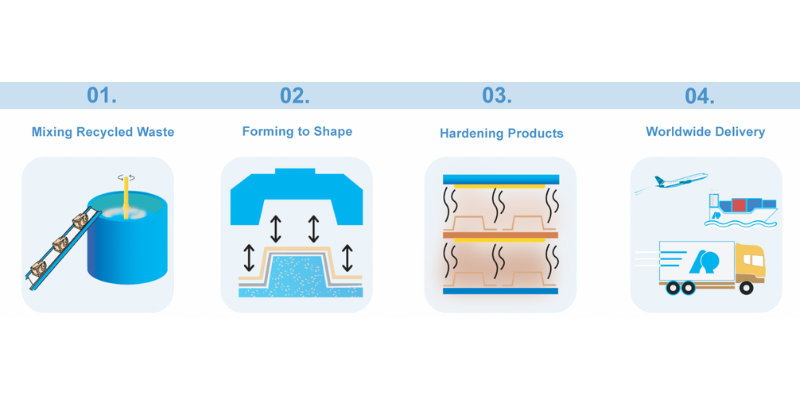
What Are Moulded Pulps?
Here's What You Need To Know!

What Is Moulded Pulp?
While moulded pulps may appear to be a foreign material, it is more common in our daily lives than you think. From fast food tableware, egg, and fruit trays, to protective padding for fragile goods, this product has been in the market for some time now. But what exactly is moulded pulp? The moulded pulp is a highly versatile material made from old newsprint or kraft papers. The raw materials of the moulded pulp determine the color, surface texture, and strength of the packaging. Moreover, because it is made of such materials, it can be made into single-use containers that are extremely environmentally friendly and sustainable.
Our production processes are eco-friendly, transforming raw materials such as old newspapers and corrugated cases into moulded bottles, containers, and trays at the most affordable cost.
Benefits of Moulded Pulps.
Single-Use Product
To prevent cross-contamination and for hygiene purposes, APEX moulded pulps are intended for single-use only. Unlike, for example, reusable plastic bedpans or urinals, soiled moulded pulps have to be disposed of appropriately.
Made of Recycled Products & Biodegradable
Made using old newsprint or kraft papers as raw materials, this product can even be further recycled back to its raw materials or biodegraded after their useful life-cycles.
Eco-friendly & Sustainable
Previously, moulded pulp products are primarily used for the packaging of manufactured products and for food-related carriers, such as food containers and serving trays. However, demand is now increasing due to their sustainable qualities. Environmental, social, and economic concerns result in a growing search for more sustainable products and industrial processes. Moulded pulps consist simply of water and wood fibres are renewable materials and biodegradable, a perfect substitute for EPS (expanded polystyrene) foam.
Stackable
The product is designed to be stackable to enhance the efficiency of storage and inventory organisation.
Customisable
As the leading manufacturer and supplier of moulded pulps in the South East Asian region, we have the design and build engineering capability and machinery to customise our moulds to any needs, of any industry.
Suitable for a Variety of Industries
While the moulded pulp is often used as industrial packaging, it has since made its mark in the medical and agricultural industries. In the medical industries, moulded pulps are transformed into toileting containers, bedpans, and kidney trays for patients. Because of their water retention qualities, our moulded pulps are able to hold water for > 4 hours without leakage. This can be an especially important benefit to those using the product in the medical and healthcare industry that could potentially be using it to contain urine or other bodily fluids. In agriculture, they are also made into seedling containers and feeding trays. The possibilities for its application are endless.
How Are Moulded Pulps Made?
The manufacturing process involves three major steps namely; mixing, forming, and drying, with an option for pressing depending on moulded pulp applications. Traditional manual production has been overtaken by automation which is capable of producing complex mould pulps with higher yield and volume, catering to numerous applications.
Raw materials – from recycled old newsprints, kraft papers, used cardboards, left-over bamboo bagasse, wheat, etc. are mixed with water and compressed into a mould to form the desired shape. A water retention agent can be added to enhance the waterproofing property of the products.
Here is an infographic to briefly demonstrate the process of how our moulded pulps are made:

The first step begins with sorting out and checking the quality of the raw materials before they are further filtered and directed towards pulping machines to be cut into smaller pieces. Afterwhich, they are mixed thoroughly with water to a sludge-like texture.
The next step involves thoroughly mixing it before being directed to a reservoir. Through the use of forming machines, a positive mould is submerged into the sludge to form a layer over it, while the negative mould presses against the positive mould to form the required shape.
Lastly, it will be re-directed to a high-temperature dryer to harden into moulded pulp. Depending on the purpose of the pulp, it may also undergo hot pressing to smoothen the surfaces. Here at Apex Pulp, we are recycling waste to make moulded pulp because we believe in a product that is hygienic and biodegradable to protect our Earth.
Article by Apex Pulp Pte Ltd published on 4 May 2022. For further enquiries, drop us an email at sales@apexpulp.com.

